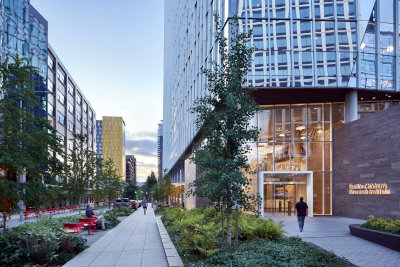Training and Enrichment
The Training and Enrichment Program is led by Dr. Margaret Rosenfeld, Professor of Pediatrics and Dr. Matt Parsek, Professor of Microbiology. Dr. Rosenfeld will continue to focus on fellows and junior faculty with interest in clinical and translational of CF research and Dr. Parsek on those interested in laboratory-based CF research. The program will continue to partner with the extensive existing training programs at the UWSOM and SCRI to a) enhance training in translational sciences of trainees already supported to conduct CF-related research, b) expose other trainees and junior faculty to the excitement of CF related research and encourage their interest in this field and c) foster collaboration between junior and senior investigators in the CF field to broaden the already robust CF scientific community at our institutions.
1. Organize meetings, seminar series, outside speakers, annual retreat and consultants to meet the needs of the UW CFRTC members and enrich the science.
The bi-weekly CF Research Seminar Series was established over 20 years ago through the RDP and an earlier Molecular Biology P30 grant. Over the last 5 years the P30 and RDP have jointly organized this series. The yearly schedule includes: a) presentations of research activities by each core director including new services or techniques available and research and development with the core; b) progress reports by all pilot grant recipients; c) overview and update of research projects from members, d) at least two outside speakers per year; e) “state of the art” updates in areas of relevance to the center such as new animal models, metabolomics, pathogenic microbiology, and development of clinical outcomes in CF.
In addition, the CF RDP and P30 jointly sponsor an annual 1-day research retreat at the Talaris Conference Center in Seattle. This program has allowed trainees, junior and senior CF investigators to discuss ongoing projects and identify future collaborations. The retreat generally has 60-70 participants and brings basic and clinical investigators together to assist communication between and within translational teams.
The annual UW CF Biostastistics/Epidemiology Working Group retreat is a half-day workshop co-organized by Dr. Rosenfeld at which investigators present works in progress in a relaxed setting at the UW Center for Urban Horticulture. The retreat is generally attended by 20-30 investigators, many of them trainees. CFRTC trainees in epidemiologic and statistical CF research are actively encouraged to attend and present their work.
2. Work closely with UW T32 programs relevant to CF related science to encourage postdoctoral training with UW CFRTC members and cores
The UW Health Sciences is a rich environment for postdoctoral training with a total of 63 T32 or other training programs. Drs. Rosenfeld and Parsek will continue to coordinate with the directors of the relevant programs to update and notify them of the P30 enrichment programs and the biomedical core services.
3. Provide UW CFRTC trainees with technical and educational workshops to enrich their training; provide one-on-one advising/mentoring
The Seattle Children’s Hospital Fellows’ College, which Dr. Rosenfeld has directed since its inception in 2003, offers a core educational curriculum to all fellows affiliated with Seattle Children’s. Seminars relevant to the P30 Enrichment and Training Program include: Launching a Successful Academic Career, grant preparation and platform presentation workshops, Statistics for Laboratory Research (a month-long course designed specifically for lab-based researchers), and the annual Fellows’ Research Day — a scientific meeting in which peer-reviewed abstracts by fellows are presented in oral and poster formats. The Fellows’ College also provides competitive awards for travel to national and international meetings, and career counseling services. Fellows’ College educational sessions are open to all P30 trainees; SCRI-affiliated MD fellows are eligible for the travel awards.
The Department of Medicine also offers an annual 2-day workshop for fellows, “Surviving and Thriving in the Research Years,” that Dr. Rosenfeld helps to organize. It is open to fellows throughout the School of Medicine and CFRTC trainees are encouraged to attend.
In addition to access to a rich program of educational opportunities, trainees have priority access to the Biomedical Core services to assist in their ongoing research projects. They are encouraged to participate in training programs provided by each biomedical core relevant to their area of research. An example is the fluorescence microscopy boot camp offered by Dr. Parsek through the Microbiology Core. This workshop trains researchers in the use of fluorescence and confocal microscopy techniques and some of the tools available to them provided by the microbiology core. In addition, the Host Response Core (HRC) now co-sponsors with the Diabetes Research Center the Cellular and Molecular Imaging Colloquium (CMIC). This series is meant to educate and inform CF investigators about the technologies and services available to them in the HRC.
In the next award period, in addition to continuing all the programs described above, we will add a new half-day Fellows and Post-Doc poster session to the annual P30/RDP retreat, allowing us to showcase the work being done by CF trainees throughout the UW and encourage networking. We will also develop a special affiliate program for junior faculty, post-docs, fellows and other trainees called Emerging CF Scientists. We will encourage these young faculty and trainees to apply for RDP and P-30 pilots.
In the next award period, Drs. Rosenfeld and Parsek will specifically engage in one-on-one advising of CFRTC trainees. All new trainees in CFRTC laboratories or research programs will be contacted by one of them to welcome them to the CFRTC program and encourage them to join the Rising Stars program. Trainees will be encouraged to attend the seminars and the annual retreat and made aware of the rich educational programs described above. Drs. Rosenfeld and Parsek will also meet with each trainee annually in conjunction with the annual retreat.

